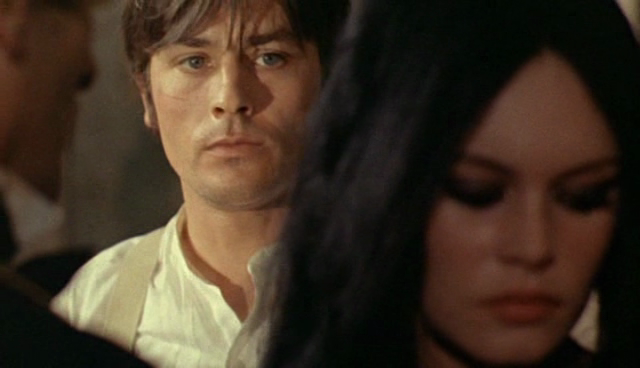
Federico Fellini directs two actors in Block-notes di un regista (Felllini: A Director’s Notebook)
FEDERICO FELLINI
MoMA Film, Museum of Modern Art
The Debra and Leon Black Family Film Center
11 West 53rd St. between Fifth & Sixth Aves.
Through January 12
212-708-9400
www.moma.org
Italian auteur Federico Fellini gave the world a view of society and the human condition like no other filmmaker. A former caricaturist, joke writer, and journalist, Fellini made twenty-four films before passing away in 1993 at the age of seventy-three. MoMA is celebrating his wide-ranging and incredibly influential legacy by screening every one of his works as a director (earning four Oscars in the process), from 1950’s Luci del varietà (Variety Lights) to 1990’s La voce della luna (The Voice of the Moon), in 4K restorations. In between are such classic, unique works as La Strada (The Road), Amarcord, La Dolce Vita, Le notti di Cabiria (Nights of Cabiria), Roma (Fellini’s Roma), Giulietta degli spiriti (Juliet of the Spirits), Otto e mezzo (8½), and La città delle donne (City of Women), among many others that helped redefine cinematic storytelling by breaking all the rules. Below are only a few favorites being shown in this complete retrospective.
NIGHTS OF CABIRIA (LE NOTTI DI CABIRIA) (Federico Fellini, 1957)
MoMA Film
Monday, December 6, 7:00
www.moma.org
Giulietta Masina was named Best Actress at Cannes for her unforgettable portrayal of a far-too-trusting street prostitute in Nights of Cabiria. Directed by her husband, Federico Fellini, produced by Dino De Laurentiis, and written in collaboration with Pier Paolo Pasolini, the film, Fellini’s second to win the Oscar for Best Foreign Language Film (after La Strada), opens with Cabiria taking a romantic stroll by the river with her boyfriend, Giorgio (Franco Fabrizi), who suddenly snatches her purse and pushes her into the water, running off as she nearly drowns. Such is life for Cabiria, whose sweet, naive nature can turn foul tempered in an instant.
Over the course of the next few days, she gets picked up by movie star Alberto Lazzari (Amedeo Nazzari), goes on a religious pilgrimage with fellow prostitutes Wanda (Franca Marzi) and Rosy (Loretta Capitoli), gets hypnotized by a magician (Ennio Girolami), and falls in love with a tender stranger named Oscar (François Périer). But nothing ever goes quite as expected for Cabiria, who continues to search for the bright side even in the direst of circumstances. Masina is a delight in the film, whether yelling at a neighbor, dancing the mambo with Alberto, or looking to confess her sins, her facial expressions a work of art in themselves, ranging from sly smiles and innocent glances to nasty smirks and angry stares.
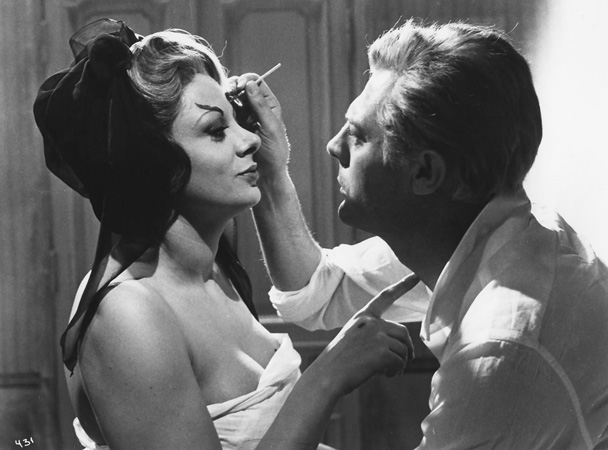
Guido Anselmi (Marcello Mastroianni) is in a bit of a personal and professional crisis in Fellini masterpiece 8½
8½ (Federico Fellini, 1963)
MoMA Film
Friday, December 10, 7:00
www.moma.org
“Your eminence, I am not happy,” Guido (Marcello Mastroianni) tells the cardinal (Tito Masini) halfway through Federico Fellini’s self-reflexive masterpiece 8½. “Why should you be happy?” the cardinal responds. “That is not your task in life. Who said we were put on this earth to be happy?” Well, film makes people happy, and it’s because of works such as 8½. Fellini’s Oscar-winning eighth-and-a-half movie is a sensational self-examination of film and fame, a hysterically funny, surreal story of a famous Italian auteur who finds his life and career in need of a major overhaul. Mastroianni is magnificent as Guido Anselmi, a man in a personal and professional crisis who has gone to a healing spa for some much-needed relaxation, but he doesn’t get any as he is continually harassed by producers, screenwriters, would-be actresses, and various other oddball hangers-on. He also has to deal both with his mistress, Carla (Sandra Milo), who is quite a handful, as well as his wife, Luisa (Anouk Aimée), who is losing patience with his lies.
Trapped in a strange world of his own creation, Guido has dreams where he flies over claustrophobic traffic and makes out with his dead mother, and his next film involves a spaceship; it doesn’t take a psychiatrist to figure out the many inner demons that are haunting him. Marvelously shot by Gianni Di Venanzo in black-and-white, scored with a vast sense of humor by Nino Rota, and featuring some of the most amazing hats ever seen on film — costume designer Piero Gherardi won an Oscar for all the great dresses and chapeaux — 8½ is an endlessly fascinating and wildly entertaining exploration of the creative process and the bizarre world of filmmaking itself. And after seeing 8½, you’ll appreciate Woody Allen’s 1980 homage, Stardust Memories, a whole lot more.
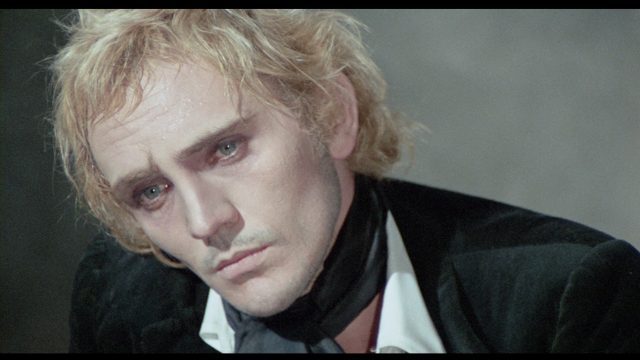
Terence Stamp is an alcoholic, fast-fading Shakespearean star in Federico Fellini’s Toby Dammit
SPIRITS OF THE DEAD: TOBY DAMMIT (Federico Fellini, 1968)
MoMA Film
Wednesday, December 8, 7:00, & Tuesday, December 21, 4:00
www.moma.org
MoMA is presenting all three of Federico Fellini’s shorter works: Agenzia matrimoniale (A Marriage Agency) was part of the 1953 omnibus L’amore in città (Love in the City), which also includes films by Carlo Lizzani, Michelangelo Antonioni, Dino Risi, Francesco Maselli and Cesare Zavattini, and Alberto Lattuada, while the 1969 documentary Block-notes di un regista (Felllini: A Director’s Notebook) was made for NBC television, about an uncompleted project. Toby Dammit concludes the Edgar Allan Poe anthology Spirits of the Dead, following Roger Vadim’s Metzengerstein, starring Jane Fonda and Peter Fonda, and Louis Malle’s William Wilson, with Alain Delon and his doppelgänger.
Adapted by Fellini and Bernardino Zapponi from Poe’s “Never Bet the Devil Your Head: A Tale with a Moral,” Toby Dammit is fiercely unpredictable, evoking La Dolce Vita and 8½ as British actor Toby Dammit (Terence Stamp) is lured to Rome to make a movie in exchange for a Ferrari. Amid bizarre interview segments, an absurdist awards ceremony, and meetings with his overbearing producers, Toby is haunted by a girl with a white ball (Marina Yaru). Toby Dammit is screening with 1962’s Le tentazioni del dottor Antonio (The Temptations of Doctor Antonio), featuring Anita Ekberg in a film dealing with sexual repression.
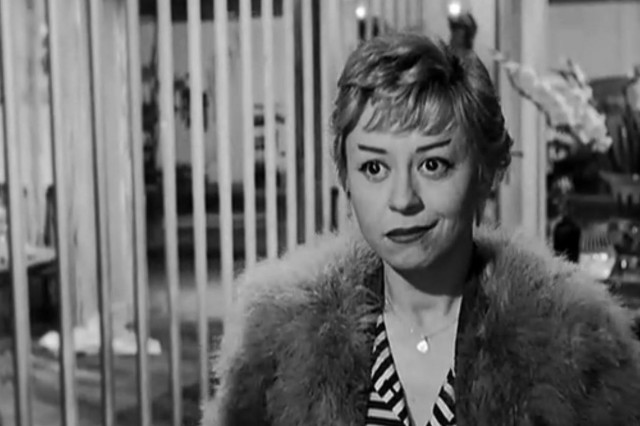
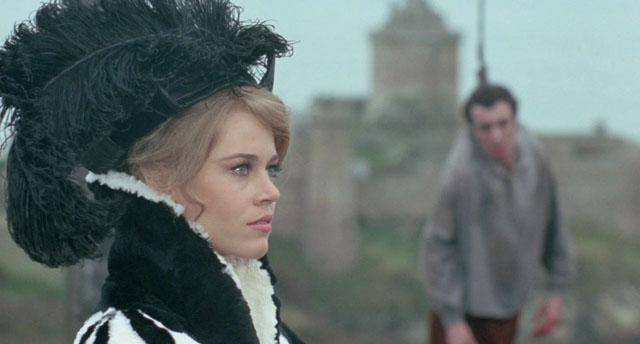
 The Quad gets right to the heart of the matter in the title of its new series, “Some Are Better than Others: The Curious Case of the Anthology Film.” Also known as an omnibus, anthology films are compilations of shorter works, often by master directors, on a specific theme. The Quad festival, running September 14-27, includes Aria, in which ten directors, among them Robert Altman, Jean-Luc Godard, Derek Jarman, Nicolas Roeg, and Ken Russell, make films inspired by opera pieces; the four-part 1945 British horror anthology Dead of Night; Lumière and Company, in which forty-one international filmmakers create fifty-two-second films using original equipment from the Lumière brothers; and Twilight Zone — The Movie, with Joe Dante, John Landis, George Miller, and Steven Spielberg revisiting classic episodes from the Rod Serling TV program. It is rare that all of the short films are of equal quality — hence, “Some are better than others” — and such is the case with the 1968 trilogy of Edgar Allan Poe stories, Spirits of the Dead.
The Quad gets right to the heart of the matter in the title of its new series, “Some Are Better than Others: The Curious Case of the Anthology Film.” Also known as an omnibus, anthology films are compilations of shorter works, often by master directors, on a specific theme. The Quad festival, running September 14-27, includes Aria, in which ten directors, among them Robert Altman, Jean-Luc Godard, Derek Jarman, Nicolas Roeg, and Ken Russell, make films inspired by opera pieces; the four-part 1945 British horror anthology Dead of Night; Lumière and Company, in which forty-one international filmmakers create fifty-two-second films using original equipment from the Lumière brothers; and Twilight Zone — The Movie, with Joe Dante, John Landis, George Miller, and Steven Spielberg revisiting classic episodes from the Rod Serling TV program. It is rare that all of the short films are of equal quality — hence, “Some are better than others” — and such is the case with the 1968 trilogy of Edgar Allan Poe stories, Spirits of the Dead.